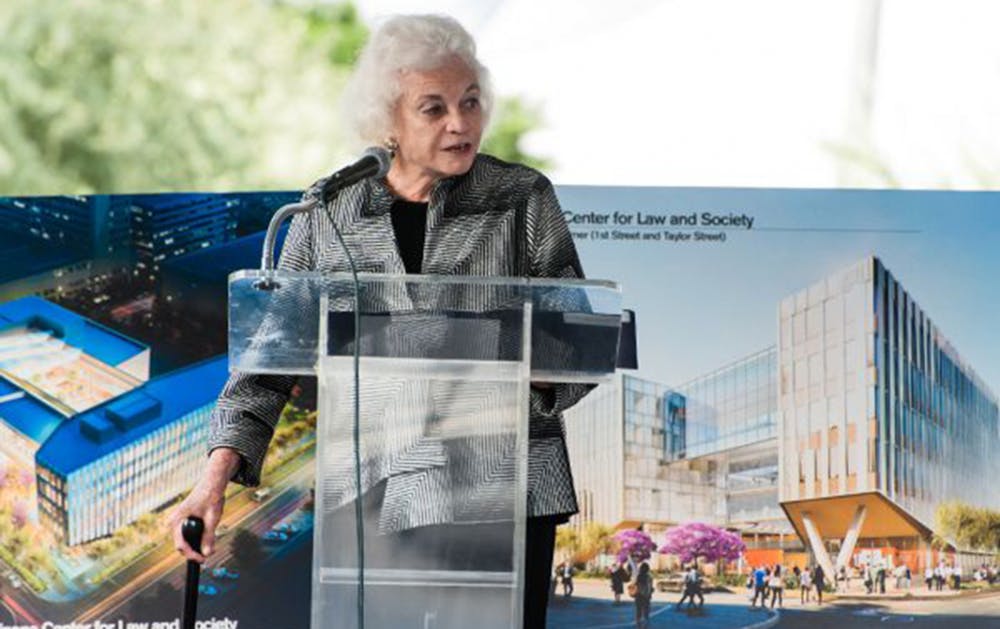Nearly four decades after Sandra Day O’Connor was sworn in as the first female Supreme Court justice in the history of the U.S., Arizona Gov. Doug Ducey proclaimed that Sept. 25 was Sandra Day O’Connor day.
The proclamation, signed by the Governor and the Secretary of State Michele Reagan, praises O’Connor saying that she “has distinguished herself as an extraordinary Arizonan and American who had impacted our nation’s history for all future generations.”
O’Connor was appointed to the high court by former President Ronald Reagan in 1981, after serving two terms in the Arizona State Senate — becoming the first person to serve in all three branches of Arizona government.
As the first female Supreme Court justice, O’Connor paved the way for a resounding change in the court system in America around the treatment and placement of women in power, according to former clerks and friends of the judge.
On the first inaugural Sandra Day O’Connor day, ASU’s Sandra Day O’Connor College of Law hosted a day-long celebration of the justice, who is 88-years-old. Even though she was not in attendance, the law school hosted a public lecture and a round table with former clerks of the justice.
Sarah Suggs, the president and CEO of the Sandra Day O’Connor Institute, which is located in the Beus Center for Law and Society on ASU’s downtown Phoenix campus said that the moment O’Connor was sworn in was a watershed moment for women in America.
“It was the first time that a woman represented one of the nine seats on the Supreme Court in our nation’s history,” Suggs said. “At the time, there were women who wept, who remember where they were when they heard the announcement … that opened up the possibility of opportunity for them, whether in the legal profession or not.”
Suggs said the impact was not isolated to the U.S., with countries around the world following the example. At the time of her appointment, the court had been male-dominated so consistently, that the chambers didn’t even have a women’s restroom, according to Suggs.
“They had to retrofit the chambers, just to provide a restroom, little things like that, but yet so symbolic,” she said. “So when you look at opportunities for women around the world and across the country, Justice O’Connor really paved the way.
“It represented a glass ceiling, groundbreaking moment in our nation’s history. And beyond the United States, there were countries who said ‘look at what the United States did, they named a woman to their Supreme Court,’ and as a result, those nations themselves appointed women to their Supreme Courts.”
Her legacy was not limited to the doors she opened for women either, with her time on the court being integral as she became widely seen as a swing vote.
One of her former clerks, Charles Blanchard, who spoke at the round table event, said this was just one part of her long and varied legacy.
“She had a strong interest in state rights and the 10th Amendment and really played a big role in bringing new life to the 10th Amendment,” Blanchard said. “For example, if the Federal Government wanted to enforce a particular law, say immigration law, it doesn’t get to usurp state and local officials to fight federal immigration law.”
Another hallmark of O’Connor’s time on the court was her ability to act independently of ideology, becoming one of the decisive votes on many key issues including affirmative action, abortion, gay rights and religious freedom, according to Blanchard.
“She didn’t hire ideologically,” Blanchard said. “She hired liberals, she hired conservatives, she hired moderates — and as a result she really taught us to be good lawyers, because we had to become advocates in her chambers.”
Blanchard agreed that O’Connor’s tenure on the bench was historic and said that for him, working as her clerk was a career defining decision.
“You know I think all of my success as a lawyer is directly attributable to the work I did for her during that one year,” Blanchard said.
Among the many dignitaries and guests that attended the event, was Doug Sylvester, dean of the Sandra Day O'Connor College of Law, who said it was an honor to pay tribute to the justice on the anniversary of her swearing in.
"There has been no greater champion for the things we value most as a society — justice, equality and the rule of law — than Sandra Day O'Connor,” Sylvester said in an emailed statement. “She grew up in a much different world, but her brilliance, perseverance and principled leadership helped reshape it for the better.”
Reach the reporter at isaac.windes@asu.edu or follow @isaacdwindes on Twitter.
Like The State Press on Facebook and follow @statepress on Twitter.




